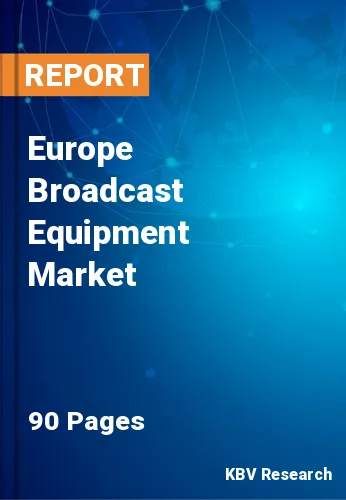The Europe Broadcast Equipment Market would witness market growth of 4.6% CAGR during the forecast period (2021-2027).
Users now have the ability to access media content of their choosing in terms of entertainment, knowledge, or social activity anyplace, at any time, due to the expanding range of devices designed to accommodate digital media and increased access to high-speed internet. There is a wide range of broadcast devices available in the market. Using the newest broadcast technology has become important in order to assure the greatest valuable content production, regardless of whether it is utilised in radio or television. Diverse channels and stations in different markets employ different types of technology, which is primarily determined by the company's specific requirements and budget, albeit in general.
Consumer demand for higher-quality video and audio has resulted in fast advancements in broadcast equipment and technology over the past few decades. With material being developed in Ultra HD and 4K formats, IP live-production technology was developed to allow for streaming in the same format for increased video quality. This is especially important in live production, where system control must be fluid and efficient.
Consumers today have more access to a broad selection of communication and media services than it has ever been, and convergence is turning toward the use of communication services and the consumption of more information. For example, content that was formerly exclusively available on televisions, in movie theatres, or in newspapers is now available on smartphones, tablets, and IP TVs. Similarly, conventional broadcast television continues to grow in prominence, with consumers in the United Kingdom viewing over 4 hours each day on average.
ETSI, the European Broadcasting Union, and CENELEC form the Broadcast Joint Technical Committee. The committee is in charge of television, radio, data, and some other broadcast systems delivered via satellite, cable, and terrestrial transmitters. The European Broadcasting Union negotiates approximately 30,000 hours of free-to-air sport each year, featuring events like the Paralympic Games, the Tour de France, the FIFA World Cup 2022, as well as the International Biathlon World Championships.
The Germany market dominated the Europe Broadcast Equipment Market by Country in 2020, and would continue to be a dominant market till 2027; thereby, achieving a market value of $392.5 million by 2027. The UK market is poised to grow at a CAGR of 3.7% during (2021 - 2027). Additionally, The France market would experience CAGR of 5.3% during (2021 - 2027).
Based on Technology, the market is segmented into Analog and Digital. Based on Product Type, the market is segmented into Encoders, Antennas, Amplifiers, Transmitters/Repeaters, Switches, Video Servers, Modulators, and Others. Based on Application, the market is segmented into Television, and Radio. Based on countries, the market is segmented into Germany, UK, France, Russia, Spain, Italy, and Rest of Europe.
Free Valuable Insights: The Global Broadcast Equipment Market Size will Hit $6 Billion by 2027, at a CAGR of 4.8%
The market research report covers the analysis of key stake holders of the market. Key companies profiled in the report include CommScope Holding Company, Inc., Evertz Technologies Limited, Harmonic Inc., EVS Broadcast Equipment SA, Grass Valley, Wellav Technologies Ltd., Eletec S.a.r.l., Clyde Broadcast Technology Ltd., Telefonaktiebolaget LM Ericsson, and Cisco Systems, Inc.
By Technology
By Product Type
By Application
By Country
Our team of dedicated experts can provide you with attractive expansion opportunities for your business.

